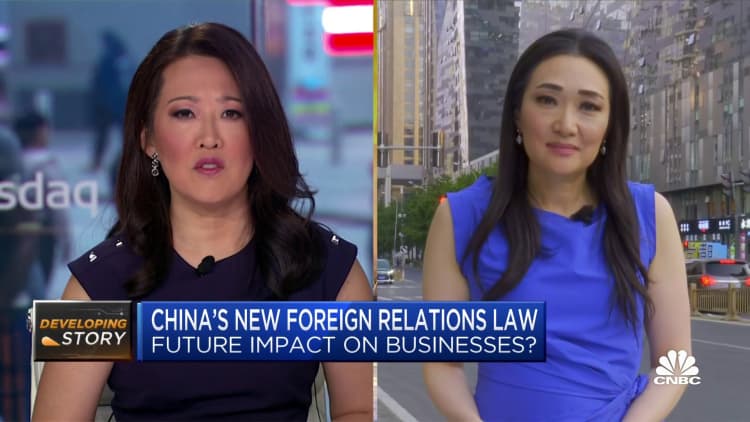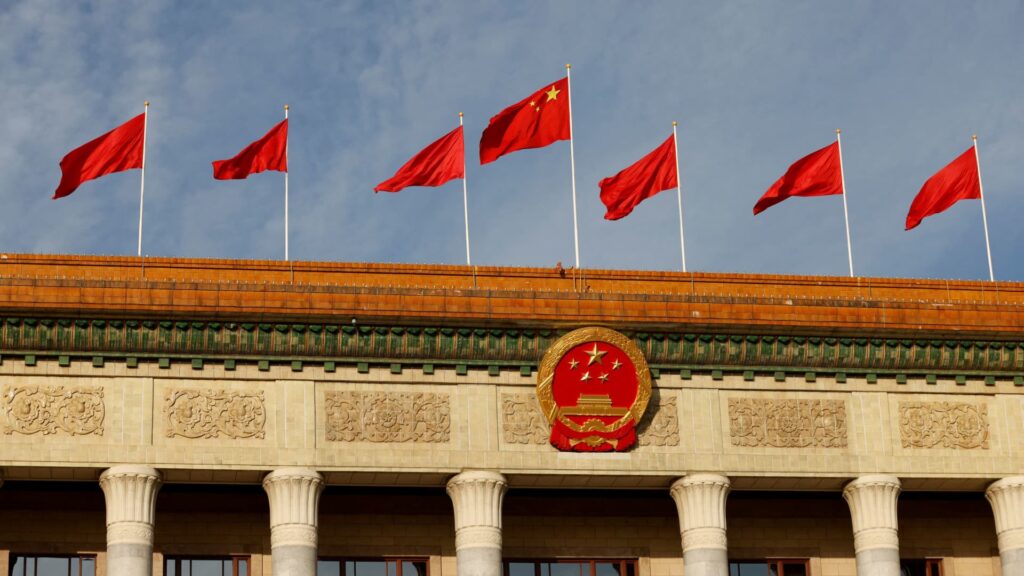The Chinese flag flies over the Great Hall of the People before the opening ceremony of the Belt and Road Forum (BRF), celebrating the 10th anniversary of the Belt and Road Initiative, in Beijing, China, October 18, 2023.
Edgar Su | Reuters
BEIJING – China is strengthening national security measures by expanding measures to protect state secrets to include a broad category of “business secrets.”
Chinese President Xi Jinping on Tuesday signed an order to formally adopt amendments to the “Protection of State Secrets” law, according to state media, which reported that lawmakers approved the updated law at a meeting earlier that day.
The new rules, which are due to come into force on May 1, describe how precautions taken regarding state secrets should also apply to non-confidential information known as business secrets. The law broadly defines business secrets as information that would result in an “adverse effect” if leaked, and said specific measures would be published separately.
Jeremy Daum, a senior fellow at Yale Law School's Paul Tsai China Center, said that article on business secrets is “the most problematic.”
“There is a risk that individual departments will overly define matters as 'business secrets,'” Daum said. He also founded the website China Law Translate, which has published an unofficial English translation of the new rules.
“This limits the public’s right to know and also exposes people to potential liability.”
For foreign companies, it is this lack of clarity that will continue to pose an unidentified risk to doing business in China.
Jeremy Daum
Paul Tsai China Center at Yale Law School
While China regularly reveals a certain amount of information about government plans and economic data, the country is often considered more opaque compared to many developed countries.
For example, high-ranking officials in China have disappeared from public view without official explanation. Policies, even those that support businesses, do not always come with specific implementation dates.
Last year, new Chinese laws on espionage and foreign policy included sweeping phrases such as “state secrets” that were left open to interpretation by authorities. Separate rules on the types of data foreign companies in China can send outside the country did not provide formal clarification on what would be considered “important data” and therefore subject to export restrictions.

“For foreign companies, it is the lack of clarity that will continue to pose an unidentified risk to doing business in China,” Daum said.
He said, “Adding business secrets, and mentioning information that does not become confidential until it is combined with other information, all of this raises concerns about the possibility of confidential information being accidentally violated.”
“But in practice, the protection of state secrets has previously extended to seemingly benign situations, and foreign companies persist.”
– Increasing concerns related to national security
The updated state secrets law comes as Beijing and Washington increasingly point to national security risks when announcing new restrictions on businesses.
“The new law will add to the general feeling among the foreign business community that the Chinese leadership’s preoccupation with national security has made the country’s business environment more difficult,” said Gabriel Wildau, managing director of consulting firm Teneo.
“China's economic growth expectations remain the main factor influencing foreign investment decisions, but the Secrets Law adds another obstacle at the margins,” he said.

The rules classify state secrets as information that, if leaked, “may harm” China's security and interests in politics, economy, national defense, foreign affairs, technology and other fields, according to a translation of China's law.
The law also maintained restrictions on travel abroad by people currently or recently working for state secrets.
“I don't know that their coverage will be meaningfully expanded through the revisions, but the overall view of national security, a topic that runs through this law and other recent security laws, has generally created some barriers to travel,” Daum said.
“A document on counterintelligence precautions issued a few years ago required a wide range of people traveling in a professional capacity to obtain security briefings before departure.”
The final version of the book “Guarding State Secrets” has been under government discussion for months.
The amended law provides “a strong legal guarantee to better protect national sovereignty, security and development interests,” Li Zhaoxong, director of the Central Security Bureau and the National Administration for the Protection of State Secrets, wrote on Wednesday in an article published by the People's Daily newspaper. , Official Gazette of the Communist Party of China. This is according to a CNBC translation.
Lee pointed out how important it is to disclose information that should be made public, while ensuring confidentiality as needed. The article did not mention business secrets.
The Standing Committee of China's National People's Congress approved the final version of the updated State Secrets Law after studying a round of revisions in October. The law was first adopted in 1988.
Daum noted that many of the changes in the new rules are “updates to new technology and style changes.”
He added, “The law provides clarity in some areas, limits leadership responsibility in some cases, and provides compensation to people whose rights have been restricted due to confidentiality requirements.”
China's National People's Congress is scheduled to begin its annual meeting next week, at which the country's top leadership will issue its economic plans and forecasts, as well as outlines of key policies.
